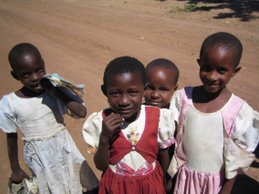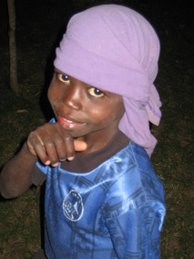Msichana
The reason I had my heart set on going back to Mwanza this year was to see Sabina, an incredibly bright and vivacious little girl I taught last year at Hisani. She was one of the community children that came every day for lessons, though I'm sure she taught me far more than I managed to impart to her. During one of the weeks I was teaching, I switched from doing mornings to afternoons so I could fit in some interviews for my research project and Sabina stopped coming to school because I wasn't there. I can assure you I didn't miss teaching any morning classes after that!
I went back this year to see how she was doing and find a way to pay for her school fees once she got to secondary school. Only primary school is free in Tanzania, though uniforms and supplies are compulsory and must be supplied by the students. Many can't afford to buy them and therefore can't attend school. Only about 10% of the population completes primary school and go on to secondary school. Sabina was really smart and a quick learner, I wanted to help her achieve as much as possible.
Sabina and me, June 2005
It was too late. Though I tried to find her in the small village the family had moved away. I heard from former neighbours Sabina had stopped going to school to stay home and help the family.
At both of the orphanages I've been to, boys far out number girls. It's much harder for girls to leave a bad home; no matter how bad the home life, the situation on the streets can be much tougher. Joseph told me that when a girl is on the streets she may be a "good girl" for a night or two, but eventually she will have to turn to prostitution to support herself.
The few girls I've come across are much shyer, much more timid. I talked to a friend of mine yesterday who's just come back from a couple of months in Mexico. We agreed that we found it really frustrating how difficult it was to interact with women and girls in the places we've been travelling to. My friend commented that it's so easy to forget how effective conditioning is: when you grow up thinking you are worth less you start to believe it.
All over the developing world, girls drop out of school to stay home and help the family at higher rates than boys. Their chances of working their way out of poverty, of gaining independence, are over before they begin. With education comes empowerment, knowledge and choices. The more educated a girl is, the less likely she is to contract HIV.
...a recent Post article quotes Stephen Lewis, the U.N. special envoy for AIDS in Africa, as coming out strongly against the descrimination of women at the Global AIDS conference in Toronto last week:
Lewis...said another undeniable fact in the battle against AIDS is the inequality of women and how that puts them at high risk of becoming infected.
Women account for nearly half of all HIV-infected adults worldwide and for 59 percent in sub-Saharan Africa.
"It is the one area of HIV and AIDS which leads me feeling most helpless and most enraged," he said. "It's a ghastly, deadly business, this untrammeled oppression of women in so many countries on the planet."








1 comment:
Hi natasha, I just wanted to drop by and say hi. I'm completely in awe of all the good work you are doing. And while, I don't often comment, I'm reading, watching, listening to everything you are saying.
Post a Comment